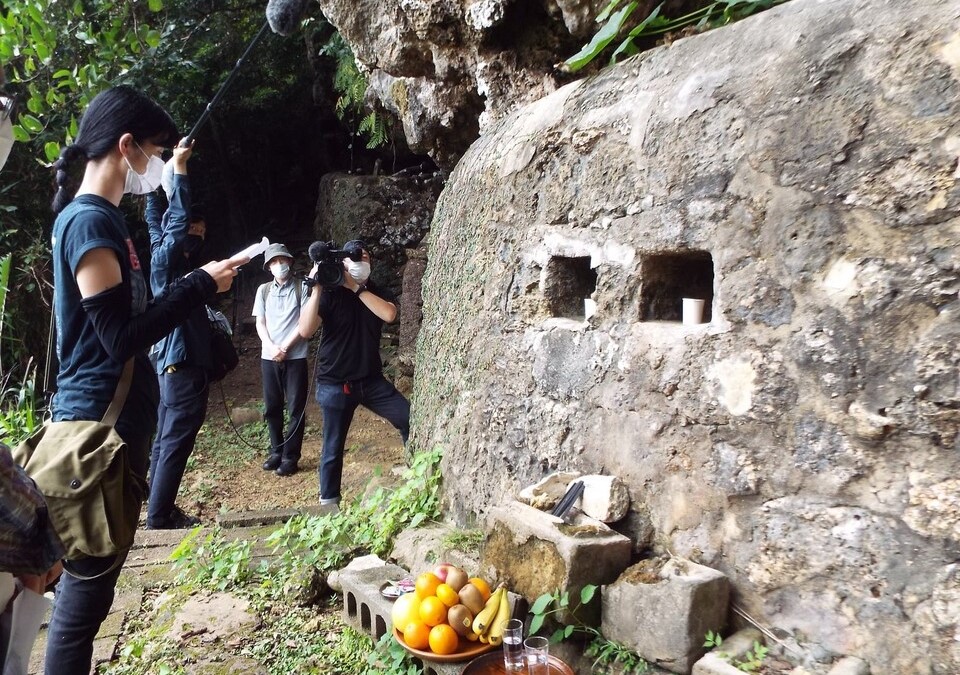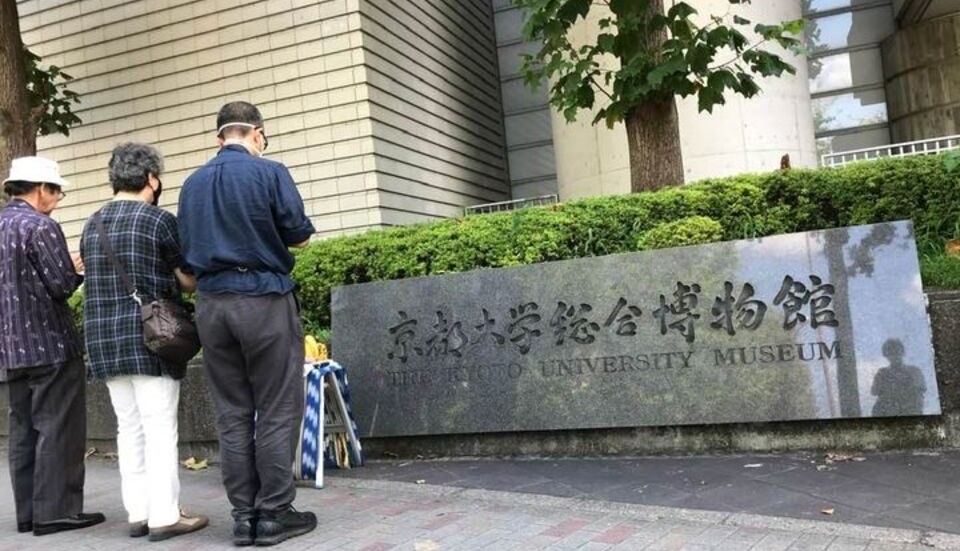The struggle for the return of Ryukyuan ancestral remains

BY YASAKATSU MATSUSHIMA FOR DEBATES INDÍGENAS
In 1879, the Ryukyu Islands were annexed by Japan. For decades, Japanese anthropologists desecrated graves and stole Ryukyuan human remains. Through eugenics, the scholars wanted to prove that the Japanese were superior to the conquered ethnic groups. The looting and storage of the remains in museums have damaged funeral practices, the spiritual world and dignity of the Ryukyu people.
Rykyuans are diverse peoples who since time immemorial have been inhabiting the Okinawa, Amami and Sakishima islands, which altogether form the Ryukyu archipelago. Historically, its peoples spoke various Ryukyuan languages, which are non-intelligible to Japanese speakers, and practiced systems of beliefs different from Japan. Despite clear cultural differences with the Japanese, and the fact that until its annexation by Japan in 1879, the Kingdom of Ryukyu was an independent state, today Japan neither recognizes Rykyuans as distinct Indigenous Peoples, nor as minorities, but rather considers them to be a subgroup of Japanese people.
In the 1850s, the Government of the Kingdom of Ryukyu concluded the Treaties of Amity with the United States of America, France and the Netherlands. These three countries, as well as the Qing Dynasty (now China), had recognized Ryukyu as an independent country. Despite this recognition, following the annexation of Ryukyu by Japan, the Japanese Government confiscated and disregarded these original treaty texts.
The expansion of the empire and the desecration of graves
Ever since the annexation and colonization, Ryukyuans have been discriminated by Japanese and treated as a second-class citizens. This discrimination has been manifested in various ways, including the desecration of Ryukyuan burial sites by Japanese academics.
In 1929, associate professor Takeo Kanaseki from Kyoto Imperial University took the human remains of around 100 people from graves in several locations on the Okinawa islands without any consent from the bereaved families and residents. Kanaseki conducted his research in Ryukyu under the supervision of professor Buntaro Adachi from the same university with a research grant provided by the Imperial Academy.
Two other researchers from the same university, Muneyoshi Miyake and Eishi Nakayama, took another 300 human remains from the Amami Islands. This theft was done under the supervision of professor Kenji Kiyono at the same university, who has overall "collected" about 1,400 human remains belonging to the Ainu (an Indigenous group traditionally inhabiting the northern part of the Japanese islands and parts of today’s Russia), Ryukyuans, Chinese, Koreans, Indigenous Peoples of Taiwan, Native Americans and more.
These acts of burial site desecration and theft of human remains by Japanese anthropologists was done as a part of a drive to develop the basis and ways of governing other ethnic groups in the process of expanding Japan's empire. Via eugenics and human remains measurement, academic researchers wanted to prove that Japanese are superior to Ryukyuans.
Movement for the repatriation of Ryukyuan human remains
In May 2017, I, as a representative of the Society for the Repatriation of the Human Remains of Ryukyuans, requested access to information about and the repatriation of the Ryukyuan human remains kept at Kyoto University. My requests, however, have been refused because the university "will not answer individual inquiries”.
On 4 December 2018, I, along with other plaintiffs, including Ryukyuan activists and descendants of those whose remains were stolen by Japanese anthropologists, filed a lawsuit against Kyoto University requesting the return of, apology and compensation for the stolen Ryukyuan human remains. In court, Kyoto University insisted, without any rational explanation, that its researchers did not steal the remains, even though such theft was against criminal law at the time.
In July 2019, in its "Letter of Request" to Kyoto University, the Anthropological Society of Nippon refused to repatriate any human remains and requested the continuation of academic research on them, recognizing them as "ancient human skeletons" subject to research. However, these human remains are not research objects; rather, they are sacred and subject to their peoples’ rituals, and there are also ritual successors for them.
The Anthropological Society of Nippon, originally called “Friends of Anthropology”, was founded in 1884 and comprised of 10 academic researchers at the time, including Shogoro Tsuboi, a physical anthropologist from Tokyo Imperial University. In 1903, this society caused the so-called "Academic Anthropological Pavillion Incident" when it put Ryukyuans, Ainu and Indigenous Peoples in Taiwan on display. To this day the society has neither reviewed nor apologized for the incident. And its letter in support of Kyoto University shows that the colonialist mindset still persists in the Society.
 Kyoto University possesses remains taken from the Momojyana tomb, where members of the royal family of the Ryukyu Kingdom are buried. Photo: Yasukatsu Matsushima
Kyoto University possesses remains taken from the Momojyana tomb, where members of the royal family of the Ryukyu Kingdom are buried. Photo: Yasukatsu Matsushima
Colonialism in justice and in the university
On 21 April 2022, the Kyoto District Court decided that Kyoto University can use those human remains indefinitely for academic studies. The judges did not present clear reasoning as to why the university and its academic researchers have more of a right to keep and conduct research on the stole remains than Indigenous Ryukyuans have for the repatriation of their ancestral remains. The judges also did not consider the historical background of the theft under the colonization and annexation of the kingdom.
Finally, they did not fundamentally recognize Ryukyuans as Indigenous Peoples despite the continuous recommendations to the Japanese government on the recognition of Ryukyuans as Indigenous Peoples by the United Nations Human Rights Committee and Committee on the Elimination of Racial Discrimination in 2008 and 2018 respectively. Due to this unfair and biased decision, we filed an appeal to the Osaka Higher Court for the return of the human remains to their original graves.
Meanwhile, another repatriation lawsuit is being heard at the Naha District Court in Okinawa against the Okinawa Prefectural Board of Education. In March 2019, the National Taiwan University transferred the remains of 63 Ryukyuan bodies to the Okinawa Prefectural Board of Education. The act was supported by Chiwas Ali, an Atayal Indigenous person of Taiwan and member of the Taiwanese Legislature, and the Chinese Ryukyu Study Society. These remains are part of the original 1929 theft by Takeo Kanaseki, who at the time brought them from Kyoto Imperial University to Taipei Imperial University, which would later become the National Taiwan University.
Around the same time, the National Taiwan University returned the remains of 64 bodies to the Bunun, an Indigenous people in Taiwan, who accepted the remains and performed their reburial.
 Ryukyuans praying in front of the Kyoto University Museum that houses ancestral remains. Photo: Yasukatsu Matsushima
Ryukyuans praying in front of the Kyoto University Museum that houses ancestral remains. Photo: Yasukatsu Matsushima
When science does not respect indigenous rights
In contrast to the return of the Bunun remains, in the process of drafting the "Okinawan Human Remains Transfer Agreement" between the National Taiwan University, Okinawa Prefectural Board of Education, and Nakijin Village Board of Education, the descendants of those human remains were excluded, and the repatriation and aerial reburial of their ancestral human remains was refused. The agreement described the remains as "humans' significant cultural heritage”, and permitted the National Taiwan University researchers to continue researching them after their transfer to Okinawa Prefecture. Thus, the university showed very different standards in treating the human remains of the Bunun peoples versus those of the Ryukyuan.
In July 2020, ignoring the bereaved families' requests of repatriation and aerial reburial, the Okinawa Prefectural Board of Education illegally measured and investigated these human remains without the agreement of the bereaved families. Today, Kyoto University and the Okinawa Prefectural Board of Education keep the human remains of our ancestors in their storage facilities and use them as specimens to further enforce the policy of assimilation of Ryukyuans.
On a number of occasions, the descendants of the people whose remains are kept by Japanese educational institutions and authorities requested permission to hold traditional ceremonies for the spirits honouring our ancestors and their remains using Indigenous languages. Authorities have continuously rejected these requests. Therefore, the ceremonies had to be conducted on public roads near the storage areas.
The prohibition of conducting traditional ceremonies in Indigenous languages for honouring human remains violates the UN Declaration on the Rights of Indigenous Peoples, specifically Article 13 concerning the rights to history, languages and oral traditions.
For the peace of the Ryukyuan spiritual world
The grave robbing, storage and research of our ancestors' human remains by academic institutions has deeply damaged our funerary practices, spiritual world, peace of mind and dignity as peoples. It also violates the UN Declaration on the Rights of Indigenous Peoples, specifically Article 12 concerning the rights to religious traditions and customs, as well as repatriation of human remains.
We Ryukyuans have always used our languages to pray for our gods and spirits in traditional ceremonies, for making peace to our gods and for seeking their protection. We believe in the “Bones of Gods” which are the spirits of our ancestors that dwell inside human remains and protect us after death.
We Ryukyuans live under colonial rule, but even when we pass away and go to Nirai Kanai (the Ryukyuan afterworld), we still face Japanese colonialism because they keep our remains. Ryukyuans are forced to live under “academic colonialism” in which Kyoto University and the Okinawa Board of Education can refuse our prayers and rituals for our ancestors' human remains.
The repatriation movement of Indigenous peoples' ancestral human remains is called “Going Home”. By returning our ancestral remains to their original graves and conducting the rituals for them, Ryukyuan Mabui (spirits) will rest in peace, and the order of the spiritual world will be restored. Until then, the peace of the spirits will never be achieved.
Yasukatsu Matsushima is an Indigenous Peoples' activist and professor at Ryukoku University. He can be reached at: This email address is being protected from spambots. You need JavaScript enabled to view it.
Cover photo: Protest against Kyoto University. Photo: Yasukatsu Matsushima
Tags: Indigenous Debates


